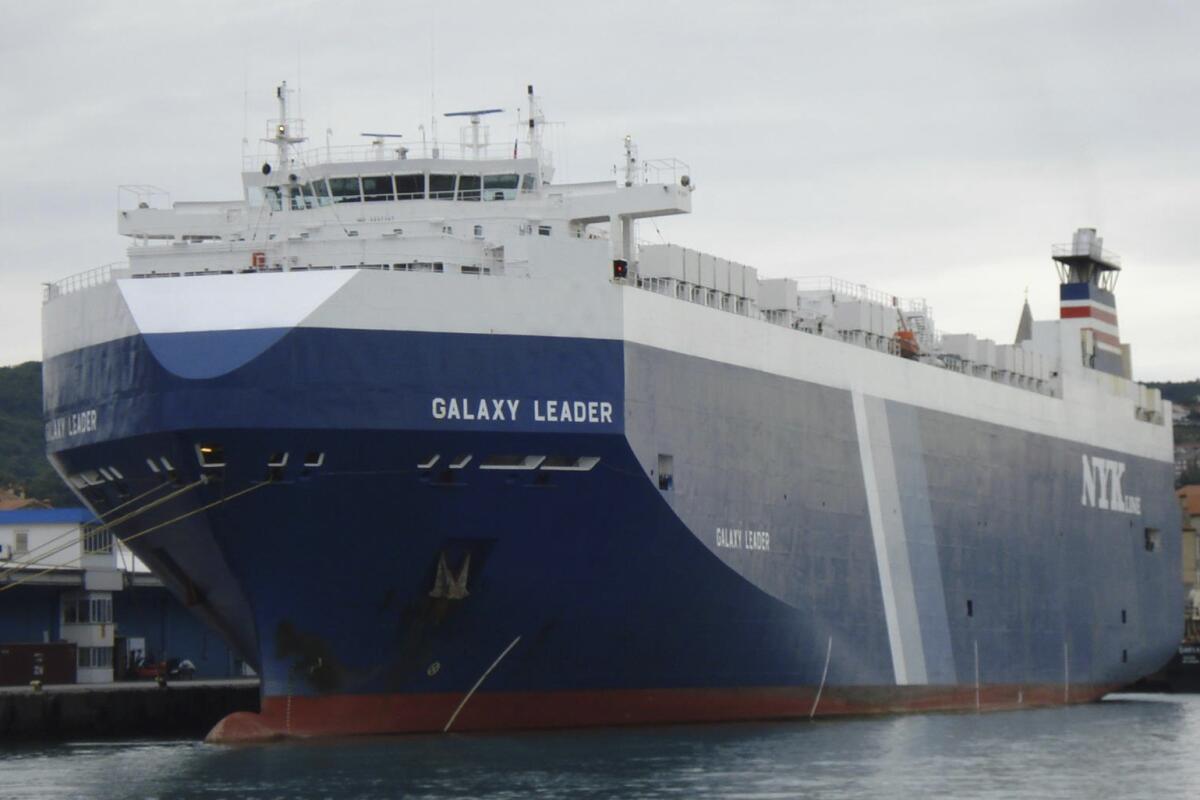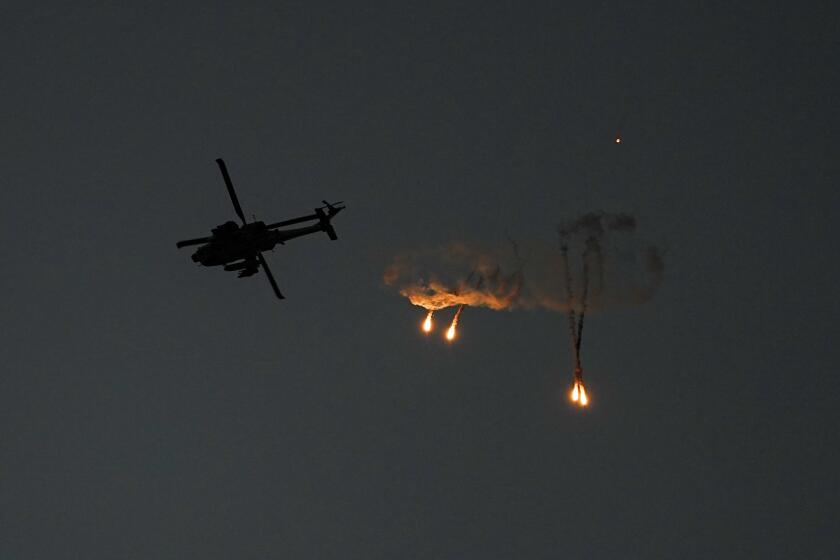Yemen’s Houthi rebels hijack Israeli-linked ship in Red Sea, raising fears of wider Mideast war

- Share via
JERUSALEM — Yemen’s Houthi rebels seized an Israeli-linked cargo ship in a crucial Red Sea shipping route on Sunday, officials said, taking more than two dozen crew members hostage and raising fears that regional tensions heightened over the Israel-Hamas war were playing out on a new maritime front.
The Iran-backed Houthi rebels said they hijacked the ship over its connection to Israel and took the crew as hostages. The group warned that it would continue to target ships in international waters that were linked to or owned by Israelis until the end of Israel’s campaign against Gaza’s Hamas rulers.
“All ships belonging to the Israeli enemy or that deal with it will become legitimate targets,” the Houthis said.
Israeli Prime Minister Benjamin Netanyahu‘s office had blamed the Houthis for the attack on the Bahamas-flagged Galaxy Leader, a vehicle carrier affiliated with an Israeli billionaire. It said the 25 crew members had a range of nationalities, including Bulgarian, Filipino, Mexican and Ukrainian, but that no Israelis had been on board.
The Houthis said they were treating the crew members “in accordance with their Islamic values,” but did not elaborate.
Netanyahu’s office condemned the seizure as an “Iranian act of terror.” The Israeli military called the hijacking a “very grave incident of global consequence.”
Israeli officials said the ship was British-owned and Japanese-operated. However, ownership details in public shipping databases associated the ship’s owners with Ray Car Carriers, which was founded by Abraham “Rami” Ungar, who is known as one of the richest men in Israel.
The Biden administration is balancing efforts to deter Iran-backed militants in the Middle East without triggering a broader regional conflict.
Ungar told the Associated Press he was aware of the incident but couldn’t comment as he awaited details. A ship linked to him experienced an explosion in 2021 in the Gulf of Oman; Israeli media blamed it on Iran.
The complex world of international shipping often involves a series of management companies, flags and owners stretching across the globe in a single vessel.
Two U.S. defense officials confirmed that Houthi rebels seized the Galaxy Leader in the Red Sea on Sunday afternoon local time. The rebels descended on the cargo ship by repelling down from a helicopter, the officials said, confirming details first reported by NBC News. The officials spoke on condition of anonymity because they were not authorized to publicly discuss the matter.
Twice in the last month, U.S. warships have intercepted missiles or drones from Yemen that were believed to be headed toward Israel or posing a threat to the American vessels. The Carney, a U.S. Navy destroyer, intercepted three land attack cruise missiles and several drones that were launched by Houthi forces toward the northern Red Sea last month.
A Times special correspondent in Gaza offers a personal account of living in a place where nowhere feels safe.
Entire generations of Palestinian families in the besieged Gaza Strip have been killed in airstrikes in the ongoing Israel-Hamas war.
On Nov. 15 the U.S. destroyer Thomas Hudner was sailing toward the Bab-el-Mandeb strait when the crew saw a drone, reported to have originated in Yemen. The ship shot down the drone over the water. The officials said the crew took action to ensure the safety of U.S. personnel, and there were no casualties or damage to the ship.
Satellite tracking data from MarineTraffic.com analyzed by the AP showed the Galaxy Leader traveling in the Red Sea southwest of Jeddah, Saudi Arabia, more than a day ago. The vessel had been in Korfez, Turkey, and was on its way to Pipavav, India, at the time of the seizure reported by Israel.
It had its Automatic Identification System tracker, or AIS, switched off, the data showed. Ships are supposed to keep their AIS active for safety reasons, but crews will turn them off if it appears they might be targeted or to smuggle contraband, which there was no immediate evidence to suggest was the case with the Galaxy Leader.
The British military’s United Kingdom Maritime Trade Operations, which provides warnings to sailors in the Persian Gulf and the wider region, put the hijacking as having occurred some 90 miles off the coast of Yemen’s port city of Hodeida, near the coast of Eritrea.
The Red Sea, stretching from Egypt’s Suez Canal to the narrow Bab el-Mandeb Strait separating the Arabian Peninsula from Africa, remains a key trade route for global shipping and energy supplies. That’s why the U.S. Navy has stationed multiple ships in the sea since the start of the latest Israel-Hamas war Oct. 7.
A forensic investigator in Tel Aviv works to reassemble remains of victims of Hamas militants, trying to understand the causes of death and the underlying cruelty.
Since 2019, a series of ships have come under attack at sea as Iran began breaking all the limits of its tattered nuclear deal with world powers. As Israel expands its devastating campaign against Hamas in the besieged Gaza Strip following the militant group’s unprecedented attack on southern Israel, fears have grown that the military operations could escalate into a wider regional conflict.
The Houthis have repeatedly threatened to target Israeli ships in the waters off Yemen.
Debre reported from Jerusalem and Gambrell from Dubai, United Arab Emirates. Tara Copp in Washington contributed to this report.
More to Read
Sign up for Essential California
The most important California stories and recommendations in your inbox every morning.
You may occasionally receive promotional content from the Los Angeles Times.














